
Hãy nhập câu hỏi của bạn vào đây, nếu là tài khoản VIP, bạn sẽ được ưu tiên trả lời.


$ a/ 12x(x – 5) – 3x(4x - 10) = 120$
`<=>12x^2-60x-12x^2+30x=120`
`<=>-30x=120`
`<=>x=-4`
Vậy `x=-4`
$b/ 9x(x + 4) – 5x(3x + 2) = 112 - 2x(3x + 1)$
`<=>9x^2+36x-15x^2-10x=112-6x^2-2x`
`<=>-6x^2+26x=112-6x^2-2x`
`<=>28x=112`
`<=>x=4`
Vậy `x=4`
$c/ 3x(1 – x) - 5x(3x + 7) = 154 + 9x(5 – 2x)$
`<=>3x-3x^2-15x^2-35x=154+45x-18x^2`
`<=>-32x-18x^2=154+45x-18x^2`
`<=>77x=-154`
`<=>x=-2`
Vậy `x=-2`

\(a,3\left(2x-3\right)+2\left(2-x\right)=-3\\ \Leftrightarrow6x-9+4-2x=-3\\ \Leftrightarrow4x=2\\ \Leftrightarrow x=\dfrac{1}{2}\\ b,x\left(5-2x\right)+2x\left(x-1\right)=13\\ \Leftrightarrow5x-2x^2+2x^2-2x=13\\ \Leftrightarrow3x=13\\ \Leftrightarrow x=\dfrac{13}{3}\\ c,5x\left(x-1\right)-\left(x+2\right)\left(5x-7\right)=6\\ \Leftrightarrow5x^2-5x-5x^2-3x+14=6\\ \Leftrightarrow-8x=-8\\ \Leftrightarrow x=1\\ d,3x\left(2x+3\right)-\left(2x+5\right)\left(3x-2\right)=8\\ \Leftrightarrow6x^2+9x-6x^2-11x+10=8\\ \Leftrightarrow-2x=-2\\ \Leftrightarrow x=1\)
\(e,2\left(5x-8\right)-3\left(4x-5\right)=4\left(3x-4\right)+11\\ \Leftrightarrow10x-16-12x+15=12x-16+11\\ \Leftrightarrow-14x=-4\\ \Leftrightarrow x=\dfrac{2}{7}\\ f,2x\left(6x-2x^2\right)+3x^2\left(x-4\right)=8\\ \Leftrightarrow12x^2-4x^3+3x^3-12x^2=8\\ \Leftrightarrow-x^3-8=0\\ \Leftrightarrow-\left(x^3+8\right)=0\\ \Leftrightarrow-\left(x+2\right)\left(x^2-2x+4\right)=0\\ \Leftrightarrow\left[{}\begin{matrix}x=-2\\x\in\varnothing\left(x^2-2x+4=\left(x-1\right)^2+3>0\right)\end{matrix}\right.\)
Bài 4:
a: Ta có: \(3\left(2x-3\right)-2\left(x-2\right)=-3\)
\(\Leftrightarrow6x-9-2x+4=-3\)
\(\Leftrightarrow4x=2\)
hay \(x=\dfrac{1}{2}\)
b: Ta có: \(x\left(5-2x\right)+2x\left(x-1\right)=13\)
\(\Leftrightarrow5x-2x^2+2x^2-2x=13\)
\(\Leftrightarrow3x=13\)
hay \(x=\dfrac{13}{3}\)
c: Ta có: \(5x\left(x-1\right)-\left(x+2\right)\left(5x-7\right)=6\)
\(\Leftrightarrow5x^2-5x-5x^2+7x-10x+14=6\)
\(\Leftrightarrow-8x=-8\)
hay x=1

20) -5-(x + 3) = 2 - 5x ⇔ -5 - x - 3 = 2 -5x ⇔ 4x = 10 ⇔ x = \(\frac{5}{2}\)
Vậy...

Bài 1
a) 5x²y - 20xy²
= 5xy(x - 4y)
b) 1 - 8x + 16x² - y²
= (1 - 8x + 16x²) - y²
= (1 - 4x)² - y²
= (1 - 4x - y)(1 - 4x + y)
c) 4x - 4 - x²
= -(x² - 4x + 4)
= -(x - 2)²
d) x³ - 2x² + x - xy²
= x(x² - 2x + 1 - y²)
= x[(x² - 2x+ 1) - y²]
= x[(x - 1)² - y²]
= x(x - 1 - y)(x - 1 + y)
= x(x - y - 1)(x + y - 1)
e) 27 - 3x²
= 3(9 - x²)
= 3(3 - x)(3 + x)
f) 2x² + 4x + 2 - 2y²
= 2(x² + 2x + 1 - y²)
= 2[(x² + 2x + 1) - y²]
= 2[(x + 1)² - y²]
= 2(x + 1 - y)(x + 1 + y)
= 2(x - y + 1)(x + y + 1)
Bài 2:
a: \(x^2\left(x-2023\right)+x-2023=0\)
=>\(\left(x-2023\right)\left(x^2+1\right)=0\)
mà \(x^2+1>=1>0\forall x\)
nên x-2023=0
=>x=2023
b:
ĐKXĐ: x<>0
\(-x\left(x-4\right)+\left(2x^3-4x^2-9x\right):x=0\)
=>\(-x\left(x-4\right)+2x^2-4x-9=0\)
=>\(-x^2+4x+2x^2-4x-9=0\)
=>\(x^2-9=0\)
=>(x-3)(x+3)=0
=>\(\left[{}\begin{matrix}x-3=0\\x+3=0\end{matrix}\right.\Leftrightarrow\left[{}\begin{matrix}x=3\\x=-3\end{matrix}\right.\)
c: \(x^2+2x-3x-6=0\)
=>\(\left(x^2+2x\right)-\left(3x+6\right)=0\)
=>\(x\left(x+2\right)-3\left(x+2\right)=0\)
=>(x+2)(x-3)=0
=>\(\left[{}\begin{matrix}x+2=0\\x-3=0\end{matrix}\right.\Leftrightarrow\left[{}\begin{matrix}x=3\\x=-2\end{matrix}\right.\)
d: 3x(x-10)-2x+20=0
=>\(3x\left(x-10\right)-\left(2x-20\right)=0\)
=>\(3x\left(x-10\right)-2\left(x-10\right)=0\)
=>\(\left(x-10\right)\left(3x-2\right)=0\)
=>\(\left[{}\begin{matrix}x-10=0\\3x-2=0\end{matrix}\right.\Leftrightarrow\left[{}\begin{matrix}x=\dfrac{2}{3}\\x=10\end{matrix}\right.\)
Câu 1:
a: \(5x^2y-20xy^2\)
\(=5xy\cdot x-5xy\cdot4y\)
\(=5xy\left(x-4y\right)\)
b: \(1-8x+16x^2-y^2\)
\(=\left(16x^2-8x+1\right)-y^2\)
\(=\left(4x-1\right)^2-y^2\)
\(=\left(4x-1-y\right)\left(4x-1+y\right)\)
c: \(4x-4-x^2\)
\(=-\left(x^2-4x+4\right)\)
\(=-\left(x-2\right)^2\)
d: \(x^3-2x^2+x-xy^2\)
\(=x\left(x^2-2x+1-y^2\right)\)
\(=x\left[\left(x^2-2x+1\right)-y^2\right]\)
\(=x\left[\left(x-1\right)^2-y^2\right]\)
\(=x\left(x-1-y\right)\left(x-1+y\right)\)
e: \(27-3x^2\)
\(=3\left(9-x^2\right)\)
\(=3\left(3-x\right)\left(3+x\right)\)
f: \(2x^2+4x+2-2y^2\)
\(=2\left(x^2+2x+1-y^2\right)\)
\(=2\left[\left(x^2+2x+1\right)-y^2\right]\)
\(=2\left[\left(x+1\right)^2-y^2\right]\)
\(=2\left(x+1+y\right)\left(x+1-y\right)\)

1.
a.\(\Leftrightarrow7x-5x=3+12\)
\(\Leftrightarrow2x=15\Leftrightarrow x=\dfrac{15}{2}\)
b.\(\Leftrightarrow6x-10-7x-7=2\)
\(\Leftrightarrow x=-19\)
c.\(\Leftrightarrow1-3x=4x-3\)
\(\Leftrightarrow7x=2\Leftrightarrow x=\dfrac{2}{7}\)
d.\(\Leftrightarrow8x^2-4x+12x-6-8x^2-8x-2=12\)
\(\Leftrightarrow-2=12\left(voli\right)\)

Ta có : x(x - 3) - 2x + 6 = 0
<=> x(x - 3) - (2x - 6) = 0
=> x(x - 3) - 2(x - 3) = 0
=> (x - 2)(x - 3) = 0
\(\Leftrightarrow\orbr{\begin{cases}x-2=0\\x-3=0\end{cases}}\)
\(\Leftrightarrow\orbr{\begin{cases}x=2\\x=3\end{cases}}\)
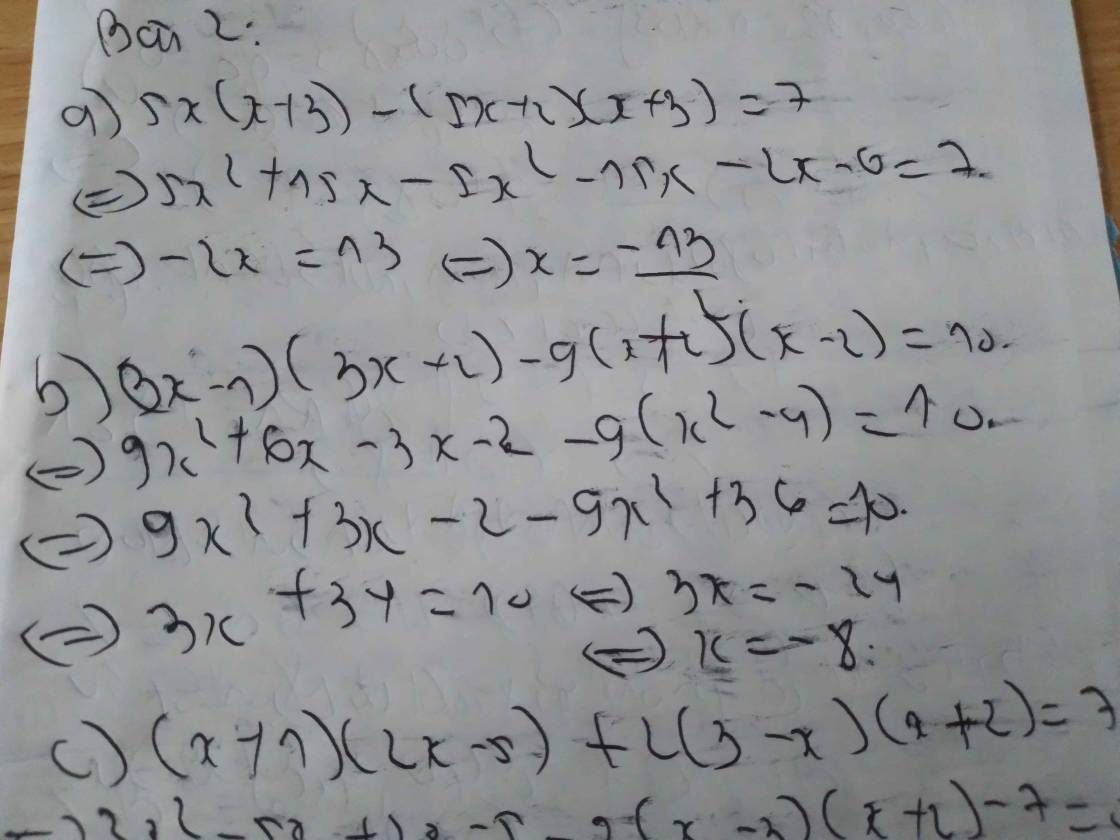
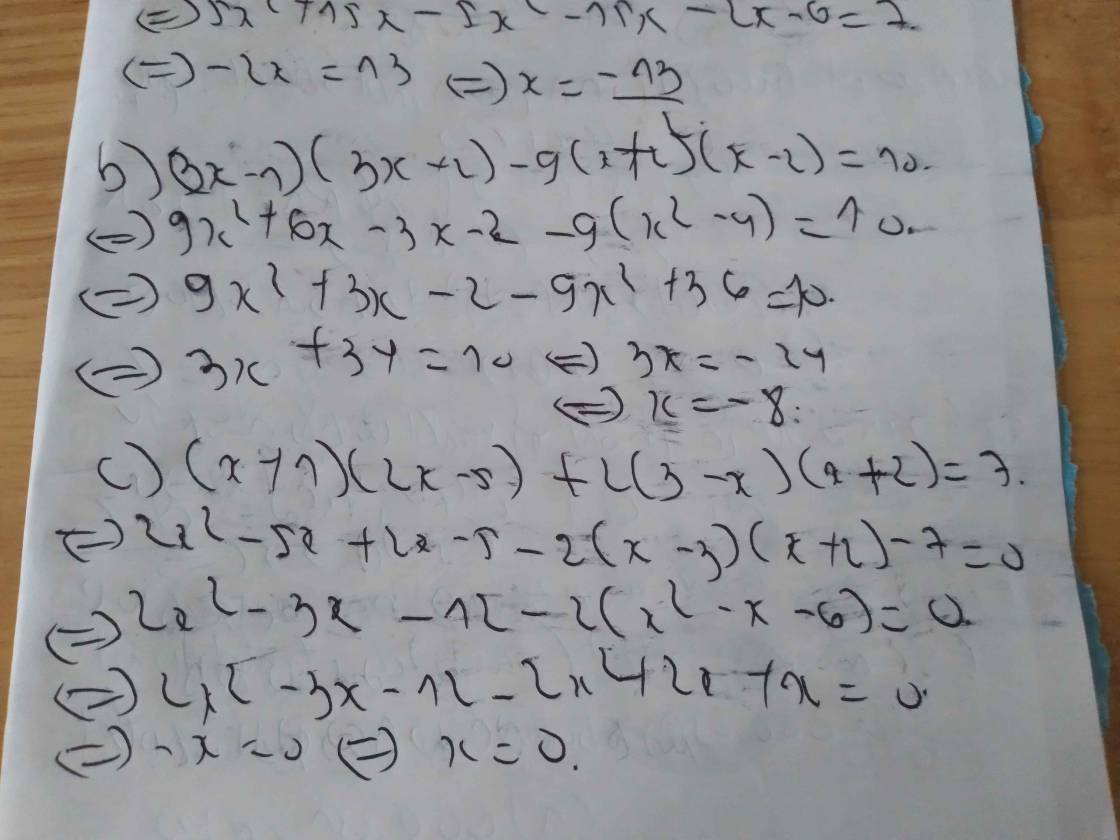
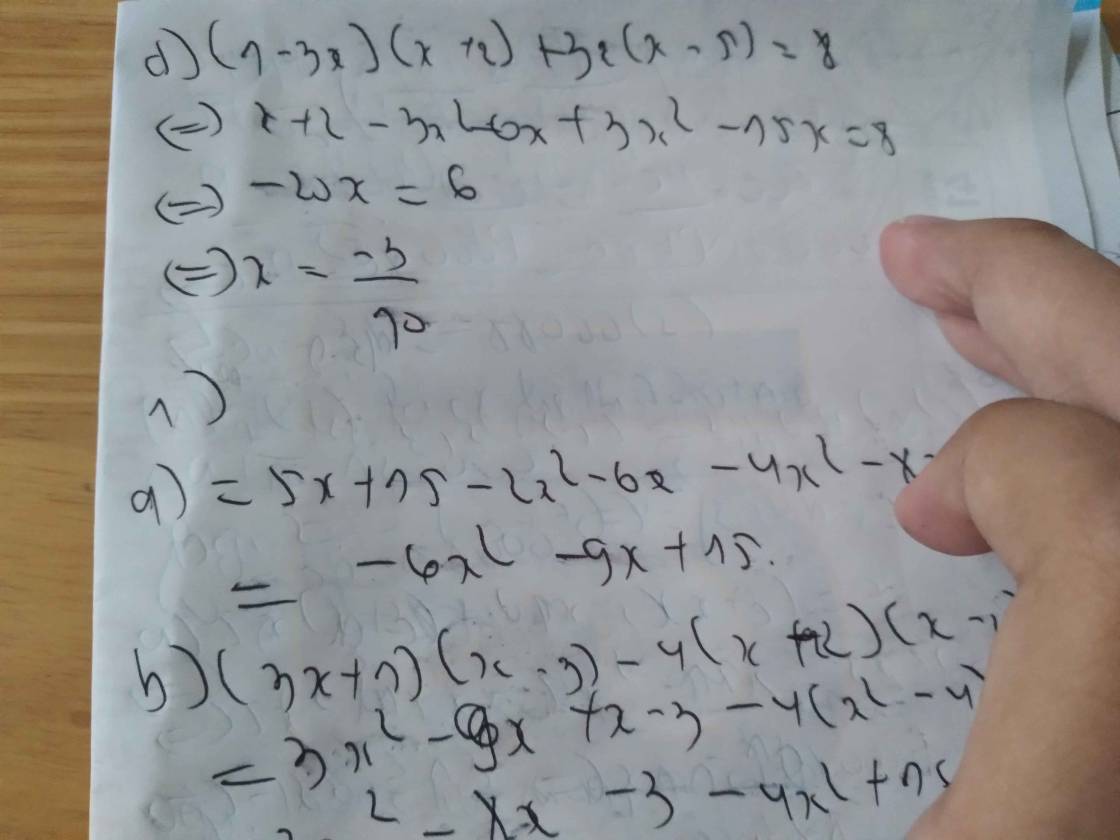
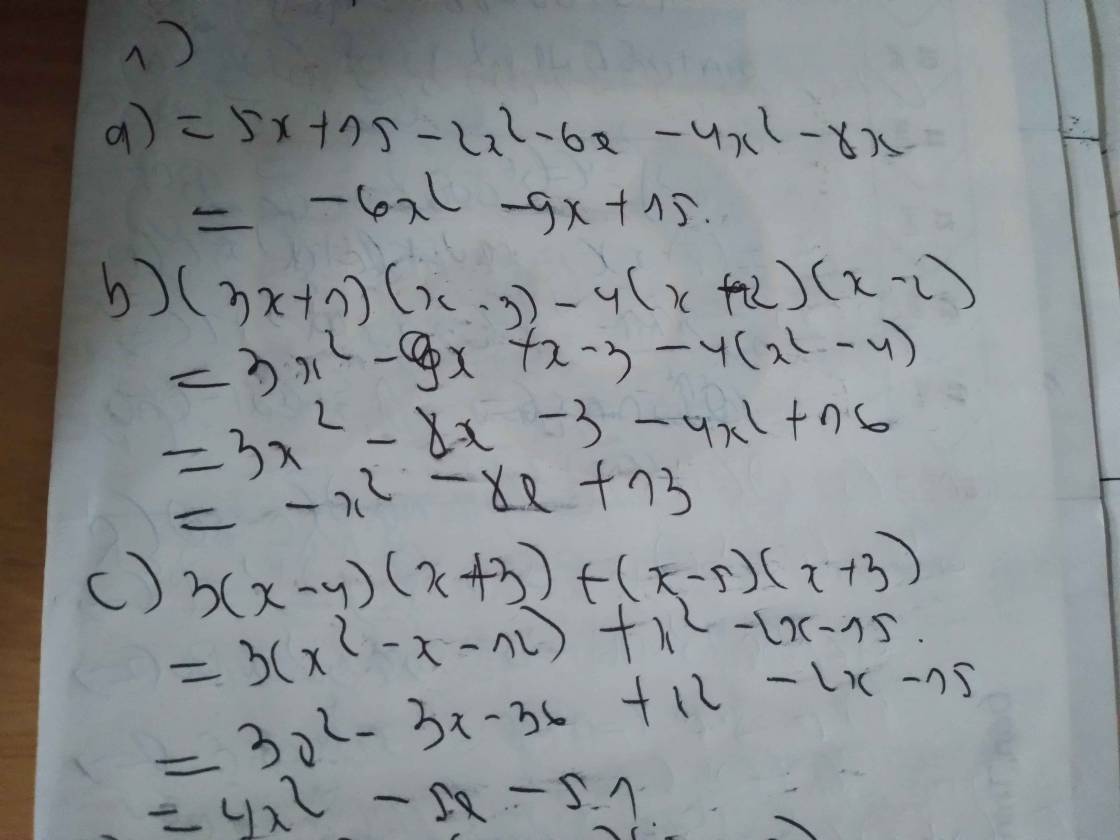
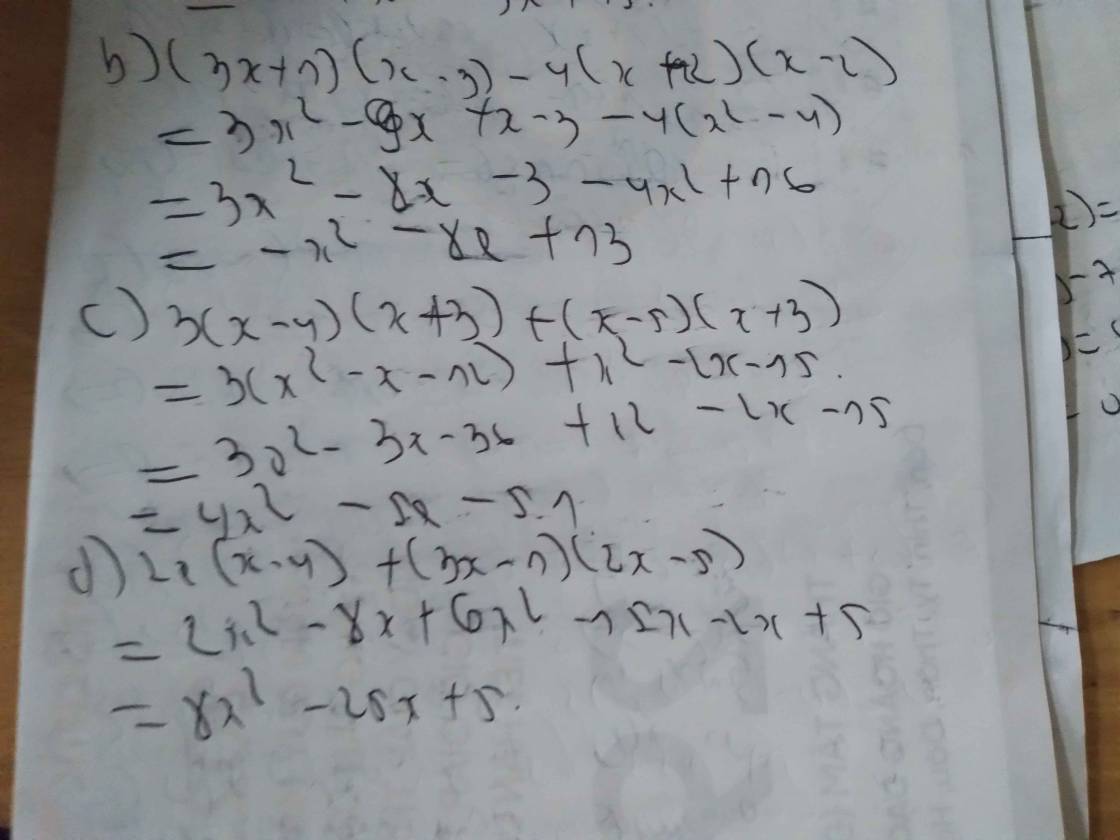
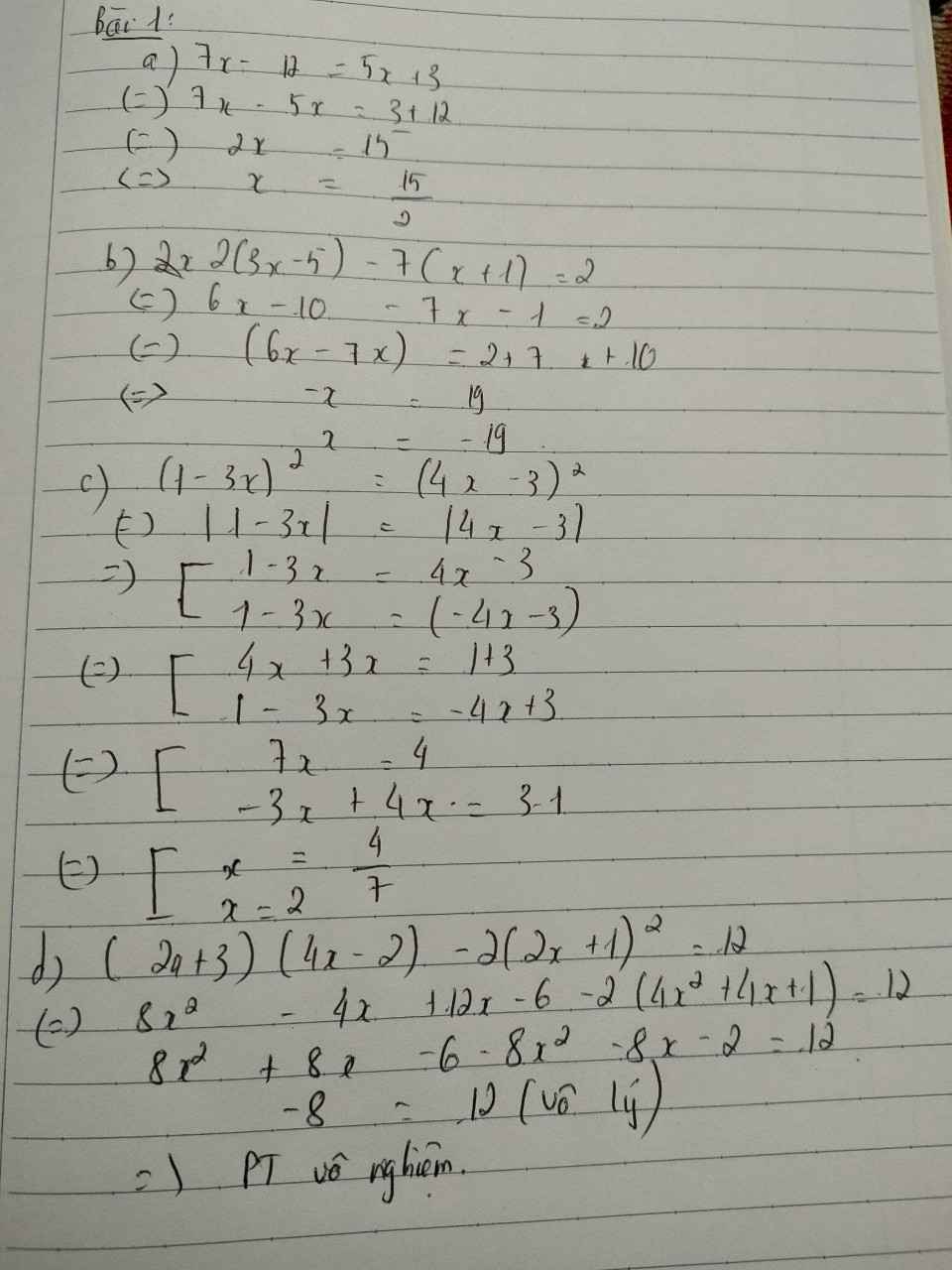
(3x - 5)(7 - 5x) + (5x + 2)(3x - 2) - 2 = 0
<=> -15x2 + 46x - 35 + 15x2 - 4x - 4 - 2 =0
<=> 42x - 41 = 0
<=> x = 41/42
Vậy x = 41/42 là nghiệm phương trình